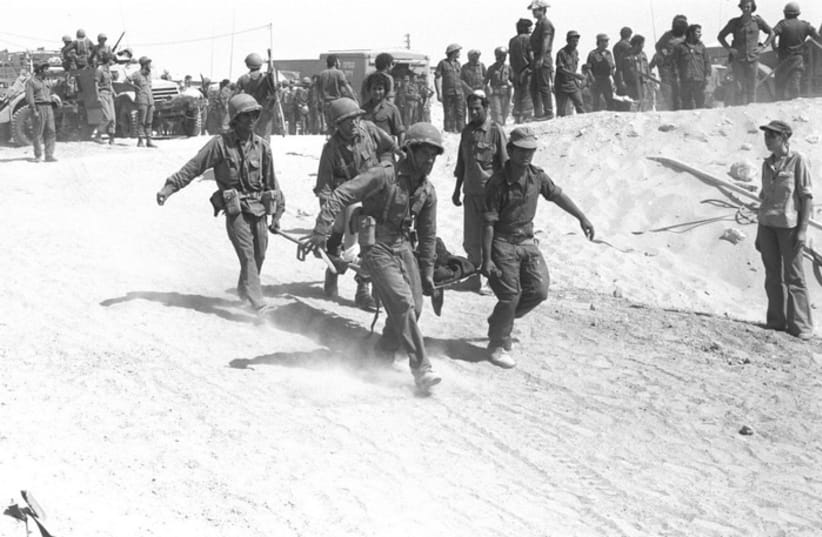Israel's Defense Ministry released hundreds of archives of minutes held between members of the security cabinet prior to and following the outbreak of the Yom Kippur War in 1973, providing much insight into the thought and decision-making process during the crisis.
While this is not a compressive overview of the discussions held between then-Prime Minister Golda Meir, her staff and Defense Ministry official's, the archives revealed some stark realities on IDF preparedness, intelligence accuracy and the degree of concern among staff.
Ranging from minutes six months before the war up until the outbreak of hostilities on October 6, 1973, some interesting topics and issues did arise during the discussions.
Capturing the long-held view by historians that Israel was surprised by the onset of the war, the announcement of renewed hostilities and the surprise among staff could be seen in the archives.
During a cabinet meeting October 6, the alarm suddenly sounded while Meir and Defense Ministry staff were discussing the security situation. Brigadier-General Israel Lior then entered the room and announced that "It's starting. There are already moves in Syria. The Syrians opened fire."
"The Egyptians took off all the camouflage and the Syrians started calling-in planes," Lior exclaimed.
In an earlier protocol, dated to April 24, 1973, Major-General Eli Zeira notified Meir and other ministers regarding the warnings on the possibility of Egypt and Syria starting a war with Israel in the next month.
"The news came to us from authorized sources... "At the same time, both in the air and on the ground," Zeira said. Nevertheless, Zeira indicated that despite the intelligence report, "in the end, the likelihood that Egypt will actually open fire in May is low."
Zeira justified his argument about the low likelihood of war by making reference to the balance of power between Israel and the Arab states, saying he was "aware of the fact that in the current balance of power [Egypt] has no chance of succeeding in the war against Israel," suggesting rather Egypt was engaged in saber-rattling to "inflate the threats of war and create a feeling in the world that Egypt is interested in war."
On a controversial issue that later arose after the war, the intelligence failure, Meir initially praised the work of Israel's intelligence community, saying in a protocol that "One of the great things we have, we can give it under the heading 'luck', is that we have strong security and other services, intelligence services, which it is doubtful many countries can compete with."
Based on the intelligence assumption at the time that a war would be irrational, which was made by AMAN, Meir warned about assuming the Arab states will act rationally.
"Not since yesterday do we live in this environment, where the neighbors are like that. They do not always do logical things. They do not always make sense. But does it matter if a war breaks out because it makes sense or because it does not make sense? After it breaks out, it is a war, and then it has its own logic," Meir said at the time.
On the decision to not do a pre-emptive strike on Egyptian and Syrian forces, which was conducted at the onset of the Six-Day War in 1967, Defense Minister Moshe Dayan said, along with Meir, that the IDF General Staff would have preferred a strike, and underestimated Egyptian and Syrian military resolve, but due to the current international conditions, decided not to strike.
"I want to admit, that my appreciation before this war was much lower for the way the Arabs would fight and much higher for our ability in the existing situation," Dayan said. "The results that are now in the battle are, for the time being, that the Arabs' capabilities are much higher than we imagined, and our ability to cope with the power imbalance do not give the good results we expected."
"I did not even offer it to the prime minister...We will not be the first to start a war," Dayan said. The thought at the time was that Israel's leadership did not want to appear as the aggressor in the war, which would have not enabled an American arms resupply in the event of war.
Early discussions on the prospect of an intelligence failure was even made by Meir in the first days of the war, but was pushed for later.
"After the victory we will sit down and have a discussion. But should we deal with that now? Shall we now begin to investigate?" Meir said.
"I do not know what we want from ourselves. It is very serious that we were surprised and did not know before. In general, we are spoiled. We need to know exactly when Arabs start something…We have an army of moralists and we need to know if that's the case."
Another interesting debate to note was the possibility of the IDF conquering or at least surrounding the Syrian capital of Damascus.
During one meeting, Shimon Peres said "If it is possible to reach the gates of Damascus without bloodshed - I am in favor." He also referred to the war as the first clash of national movements, Arab and Jewish nationalist movements, in contrast to the previous wars over territory.
"This is the first time that the Jewish people have faced the Arab, a people against a people...We are standing on our own two feet in front of a great and powerful enemy."
